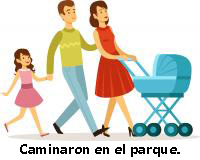

Lesson 25 - Las Noticias (The News)
Navigation: Home
→ Course
→ Lesson 25
→ Preterite
Pages in this lesson: News - Preterite - Dialogue - Reading - Quiz
This page: Learn the preterite form in Spanish (past tense) and when to use it.

Preterite
Grammar Lesson
There are two past tense forms in Spanish: the preterite and the imperfect forms. We will learn about the preterite form in this lesson and the imperfect form in a future lesson.
Preterite Verb Endings
| Subject pronouns | -ar verbs | -er & -ir verbs |
|---|---|---|
| yo | -é | -í |
| tú | -aste | -iste |
| usted, él, ella | -ó | -ió |
| nosotros, nosotras | -amos | -imos |
| vosotros, vosotras | -asteis | -isteis |
| ustedes, ellos, ellas | -aron | -ieron |
| hablar (-ar verb) | correr (-er verb) | abrir (-ir verb) |
|---|---|---|
| hablé | corrí | abrí |
| hablaste | corriste | abriste |
| habló | corrió | abrió |
| hablamos | corrimos | abrimos |
| hablasteis | corristeis | abristeis |
| hablaron | corrieron | abrieron |
Note that the nosotros preterite form for -ar and -ir verbs is the same as the present tense form. You can tell by the context if it is referring to the past or present.
Uses of the preterite
The preterite form is used to refer to an action or state of being that was completed at a specific point in the past. If you see a specific date or time that the action was completed in the past, that is a good clue that you must use the preterite form in that sentence. If the verb refers to a habitual or continuous action in the past that doesn't have a specific beginning and ending, you would use not use the preterite form.
Practice
Practice writing these verbs in the different forms of the preterite.
1) dibujar (to draw)
2) romper (to break)
3) cubrir (to cover)
Find the mistake in the sentence and re-write it correctly in the space. Don't forget to use correct capitalization, accents and punctuation, or the computer will mark it as incorrect.
|
Writing
Write a few sentences in the preterite with some verbs that are regular in the past tense. Pick at least one verb from each category below.
- Some verbs that are regular in the past tense
- -ar verbs - hablar (to speak), trabajar (to work), comprar (to buy), cantar (to sing), caminar (to walk)
- -er verbs - comer (to eat), aprender (to learn), vender (to sell), correr (to run), beber (to drink)
- -ir verbs - abrir (to open), escribir (to write), recibir (to receive), compartir (to share), decidir (to decide)
If you want to type a special character (like an accented letter) in the comments section, you could do one of the following . . .
- Select and copy the character that you need → á é í ó ú ü ñ ¿ ¡ Á É Í Ó Ú Ü Ñ « »
- Use special codes on your computer if you have numeric keypad (instructions HERE).
- Type your sentences into the text box below and use the special character buttons provided. Then select and copy your text and paste it into the comments section.
If you see an error in someone else's sentence, please respond with the correction. Comments that are not from "Janet Castrejon" (the author of this page) do not represent Simplified Spanish. If someone is writing inappropriate comments on this webpage, please send a message to [email protected] and include the page that you saw the comment on.
Lesson 25 - Las Noticias (The News)
News - Preterite - Dialogue - Reading - Quiz
Important Links
Pronouns - Pronunciation - Verbs



